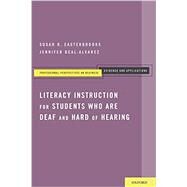Literacy Instruction for Students who are Deaf and Hard of Hearing
, by Easterbrooks, Susan R.; Beal-Alvarez, Jennifer- ISBN: 9780199838554 | 0199838550
- Cover: Paperback
- Copyright: 3/14/2013
Most students who are deaf or hard of hearing (DHH) struggle with acquiring literacy skills, some as a direct result of their hearing loss, some because they are receiving insufficient modifications to access the general education curriculum, and some because they have additional learning challenges necessitating significant program modifications. Additionally, instructional practices for DHH students tend to be directed toward two sub-populations of DHH students: those with useable access to sound and those without. Literacy Instruction for Students who are Deaf and Hard of Hearing describes current, evidence-based practices in teaching literacy for DHH students and provides practitioners and parents with a process for determining whether a practice is or is not "evidence-based." Easterbrooks and Beals-Alvarez describe the importance of the assessment process in providing on-going progress monitoring to document students' literacy growth as a primary means to direct the course of instruction. They address the five key areas of instruction identified by the National Reading Panel: phonemic awareness, phonics, fluency, vocabulary, and comprehension. In this concise guidebook, the authors present the role of assessment in the literacy process, an overview of evidence-based practices, and in the absence of such information, those practices supported by causal factors across the National Reading Panel's five areas of literacy. They also review the evidence base related to writing instruction, present case studies that reflect the diversity within the DHH population, and review the challenges yet to be addressed in deaf education.






